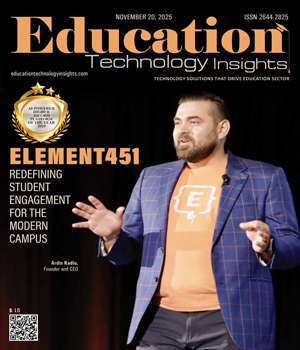THANK YOU FOR SUBSCRIBING
Be first to read the latest tech news, Industry Leader's Insights, and CIO interviews of medium and large enterprises exclusively from Education Technology Insights
AI Education for K-12 Schools: Preparing Students for the Future
Yu Lu, Associate Professor, Director of Artificial Intelligence Lab, Beijing Normal University and Abbas Wahab, Doctoral Student, Beijing Normal University
 Yu Lu, Associate Professor, Director of Artificial Intelligence Lab, Beijing Normal University and Abbas Wahab, Doctoral Student, Beijing Normal University
Yu Lu, Associate Professor, Director of Artificial Intelligence Lab, Beijing Normal University and Abbas Wahab, Doctoral Student, Beijing Normal UniversityDr. Lu Yu is an Associate Professor at the School of Educational Technology within the Faculty of Education at Beijing Normal University (BNU) in Beijing, China. He also serves as the Director of the Artificial Intelligence Lab at the Advanced Innovation Center for Future Education (AICFE). With a focus on cutting-edge research in educational technology, Dr. Lu's expertise spans learner modeling, robotics for education, intelligent tutoring systems, educational data mining, data analytics and ubiquitous computing.
Abbas Wahab is a Ph.D. Research Fellow at the AI Lab, Advanced Innovation Center for Future Education, at Beijing Normal University in Beijing, China. He is actively pursuing his Ph.D. in Educational Technology, with a research focus on AI and Generative AI in education.
Through this article, Lu Yu and Abbas Wahab emphasize the key aspects of integrating AI into K-12 education.
The integration of Artificial Intelligence (AI) into K -12 education has transitioned from a futuristic concept to a tangible reality that reshapes educational processes and influences students’ attitudes toward technology. As AI technology rapidly advances, it becomes imperative to embed AI education within the K-12 curriculum to prepare students for a future dominated by these technologies.
AI education in K-12 goes beyond merely informing students about AI tools. It involves shaping their perceptions of AI, fostering AI literacy, highlighting AI’s capabilities, and addressing emerging controversies. By introducing concepts of AI to young learners, we equip them for a future where AI plays a significant role.
Currently, primary school students are being prepared for careers that do not yet exist, many of which will be intertwined with AI and related technologies. Despite the recognition among educators that AI is crucial for the future of learning, few are prepared to teach it effectively. This gap underscores the urgent need for comprehensive AI training for teachers to adequately prepare students for future job markets.
“AI education promotes inclusivity, allowing students from diverse backgrounds to access and utilize advanced technologies. Participation in STEM activities, including AI, enhances students' likelihood of pursuing STEM careers”
AI education also bridges the gap between theory and practice. Students engage with AI through practical projects, such as building simple AI models, experimenting with machine learning algorithms, and understanding data manipulation. These hands-on experiences not only make learning more engaging but also develop critical competencies needed for future careers in AI.
Moreover, AI education promotes inclusivity, allowing students from diverse backgrounds to access and utilize advanced technologies. Participation in STEM activities, including AI, enhances students' likelihood of pursuing STEM careers. As AI becomes more prevalent across various sectors, the demand for AI-literate professionals will increase, making it essential to integrate AI education thoroughly within the K-12 system.
Advancements in educational technologies, like Generative AI (GenAI), are revolutionizing AI education. These technologies shift the focus from traditional theoretical methods to more skills-based, practical approaches tailored for students and schools. AI programs should be dynamic, with regular reviews to ensure they remain relevant and incorporate the latest AI advancements. Teaching should also encompass advanced AI concepts, such as deep learning algorithms and Generative Pre-trained Transformers (GPTs), allowing students to delve into the complexities of AI technologies. This knowledge is crucial for those aspiring to be innovators in the field.
Interdisciplinary approaches are vital in AI education, integrating subjects like ethics, data science, and cognitive science. This holistic approach ensures that students don’t merely become technical experts but also understand how AI can be ethically and beneficially applied in society. To effectively prepare the next generation of AI technologists, AI education should begin at primary levels and continue through secondary education and beyond. Collaborations with industry professionals and developers can bridge the gap between classroom learning and real-world application.
Despite challenges such as the need for well-prepared teachers and adequate resources, the long-term benefits of AI education far outweigh the costs. Students must understand that AI will significantly influence their future and that a robust AI education from K-12 onward is crucial to equip them as future leaders, thinkers, and ethical decision-makers in a technology-driven world.
Read Also
Navigating Course Map Design
Beyond the Classroom: Supporting Belonging and Wellbeing for International Students
Building Responsible AI Practice Across a University
Designing Engagement That Lasts
Digital Creativity as a Catalyst for Deeper Learning
Protecting Precious Cargo: A Comprehensive Look at School Bus Safety

I agree We use cookies on this website to enhance your user experience. By clicking any link on this page you are giving your consent for us to set cookies. More info























